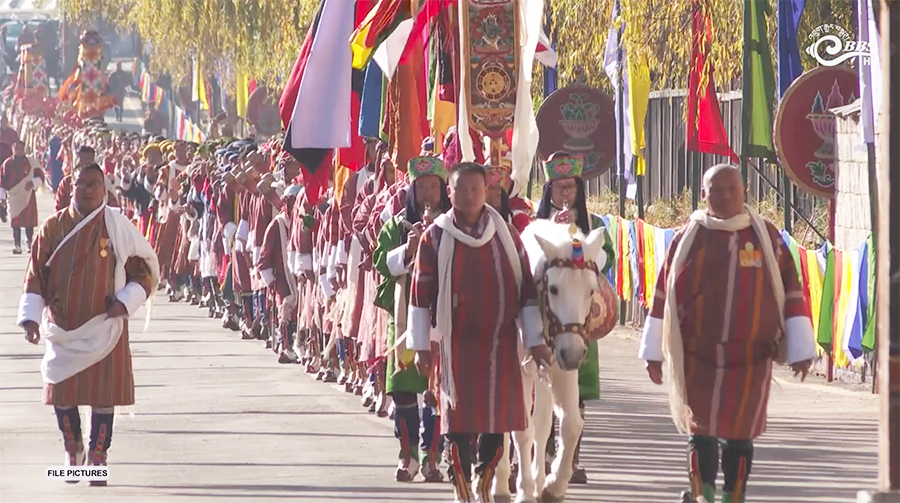
The country’s rich traditional and cultural heritage will take centre stage as the country marks its 117th National Day on Tuesday. From traditional chipdrel procession to Tashi laybay, these vibrant performances reflect the nation’s deep-rooted customs and values. These rich traditional ceremonies are being performed during important national events, but not many are aware of their origin and significance. In this story, our reporter, Kinzang Lhadon, delves deeper into the importance of each of these traditions.
During the celebration, His Majesty The King is received in a traditional chibdrel ceremony.
Chibdrel is a ceremonial procession involving men and horses to usher guests of honour to significant occasions. The term ‘Chipdrel’ is derived from ‘Chip,’ meaning horse, and ‘Drel,’ meaning a uniform line.
“Among many beliefs, one of the main reasons is that Lord Buddha once visited heaven to pay gratitude to his mother. On his way, Lha Tshangpa, Jajin, and others welcomed the Buddha with various melodies. This tradition of receiving guests continues to this day,” said Lhendup Tshering, a research officer at the Central Monastic Body.
Jibi Pawo, composed by Tsheltrim Namgyal, commonly known as Agay Penlop Haap, is another significant ceremonial procession. It is performed to bring forth blessings and ward off evils.
“Externally, it serves to ensure there are no threats to the chief guest. Internally, the pawos or heroes usher in the deities and gods as part of the procession,” said Phub Wangdi, vice principal of the Traditional Performing Arts and Music Division.
To invoke the blessings of deities before the commencement of an important occasion like the National Day, Marchang or traditional wine offering ceremony is performed with a bowl filled with freshly fermented grain.
Three horns called Yangdrons, made of ivory or wood, are attached to the rim of the bowl. One horn faces the server, while the other two are positioned on the server’s right and left.
“Long ago, when the demi-gods were defeated in battle by the gods, holy water that could cure the sick and resurrect the dead was blessed in alcohol, thus earning the name Chimi Lhai Duetse which loosely translates to ‘immortal god’s water.’ To overcome any obstacles during a celebration, alcohol is offered to appease the deities, ensuring good luck and the successful completion of the occasion,” said Lhendup Tshering, a research officer at the Central Monastic Body.
Kusung Thukten Mendrel and Zhabten offering to His Majesty The King are also integral part of the national day procession.
“Buddha’s disciple Kuengao and others could not request the Buddha to live longer; the Buddha passed away at 80. While the Buddha could live an immortal life, he chose to die, and this decision has a long story behind it. Therefore, it is important to request and pray for their long life,” said Lhendup Tshering, a research officer at the Central Monastic Body.
“Zhabten is a collective prayer, offered in melody, from all Bhutanese for His Majesty. It expresses the heartfelt wish that His Majesty lives a long life with unchanging clarity in mind, speech, and body, free from any obstacles. Furthermore, it serves as a tribute, seeking blessings for the successful accomplishment of all His Majesty’s endeavours,” said Phub Wangdi, vice principal of Traditional Performing Arts and Music Division.
A day as significant as the National Day is not complete without honouring and remembering Gongsar Ugyen Wangchuck, the first hereditary monarch who unified Bhutan and established the Wangchuck dynasty.
The founding father of Bhutan offered Buelwa as an expression of love and devotion for ushering in an unwinding era of peace and prosperity through his line of succession.
“Since the establishment of our monarchy and the strengthening of our independence in 1907, we commemorate this occasion by offering buelwa during the National Day. This serves as a heartfelt expression of our people’s gratitude for the benevolence of the monarchs,” said Phub Wangdi, vice principal of the Traditional Performing Arts and Music Division.
The National Day is a celebration of pride, unity and patriotism where Bhutanese come together to pray for everlasting happiness and prosperity under the Wangchuck dynasty. The celebrations conclude with the Tashi Laybay dance, performed as a prayer for fortune and to extend good wishes for continued joyful reunions.
“Before the gathering disperse, it serves as a prayer for fortune and happiness to prevail not only on that occasion but also for generations to come,” Phub Wangdi, vice principal of the Traditional Performing Arts and Music Division.
Over the past year, the National Day celebrations began featuring a night concert, departing from tradition and embracing diversity.
Kinzang Lhadon
Edited by Phub Gyem







